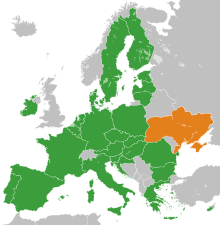Ukraine–European Union Association Agreement
| Association Agreement between the European Union and the European Atomic Energy Community and their member states, of the one part, and Ukraine, of the other part | |
|---|---|

Map of Europe with the European Union in green and Ukraine in orange.
|
|
| Type | European Union Association Agreement |
| Context | framework for cooperation between the EU and a non-EU country |
| Drafted | 30 March 2012 |
| Signed | 21 March 2014 (Preamble, Article 1 and Titles I, II, and VII) 27 June 2014 (Titles III, IV, V and VI, related Annexes and Protocols) |
| Location | Brussels, Belgium |
| Effective | Not in force |
| Condition | ratification by all signatories |
| Provisional application |
1 November 2014 (Titles III, V, VI, and VII to the extent it is EU competence) 1 January 2016 (Title IV, to the extent it is EU competence) |
| Signatories |
European Atomic Energy Community 28 EU member states |
| Ratifiers |
28 / 31
|
| Depositary | General Secretariat of the Council of the European Union |
| Languages | All official languages of the European Union and Ukrainian |
The Ukraine–European Union Association Agreement is a treaty between the European Union (EU), Euratom, their 28 Member States and Ukraine that establishes a political and economic association between the parties. The agreement has not entered into force, but parts are applied provisionally. The parties committed to co-operate and converge economic policy, legislation, and regulation across a broad range of areas, including equal rights for workers, steps towards visa-free movement of people, the exchange of information and staff in the area of justice, the modernisation of Ukraine's energy infrastructure, and access to the European Investment Bank. The parties committed to regular summit meetings, and meetings among ministers, other officials, and experts. The agreement furthermore establishes a Deep and Comprehensive Free Trade Area between the parties.
The agreement commits Ukraine to economic, judicial, and financial reforms to converge its policies and legislation to those of the European Union. Ukraine committed to gradually conform to EU technical and consumer standards. The EU agreed to provide Ukraine with political and financial support, access to research and knowledge, and preferential access to EU markets. The agreement commits both parties to promote a gradual convergence toward the EU's Common Security and Defence Policy and European Defence Agency policies.
The agreement comes after more than two decades in which both parties sought to establish closer ties with each other. On the one hand, the European Union wants to ensure that its imports of grain and natural gas from Ukraine, as well as its exports of goods to Ukraine, are not threatened by instability in the region, believing that instability could eventually be reduced through sociopolitical and economic reforms in Ukraine. Ukraine, on the other hand, wants to increase its exports by benefiting from free trade with the European Union while attracting desirable external investments, as well as establishing closer ties with a sociopolitical entity to which many Ukrainians feel strong cultural connection. Western Ukraine is found to be generally more enthusiastic about EU membership than Eastern Ukraine.
...
Wikipedia
